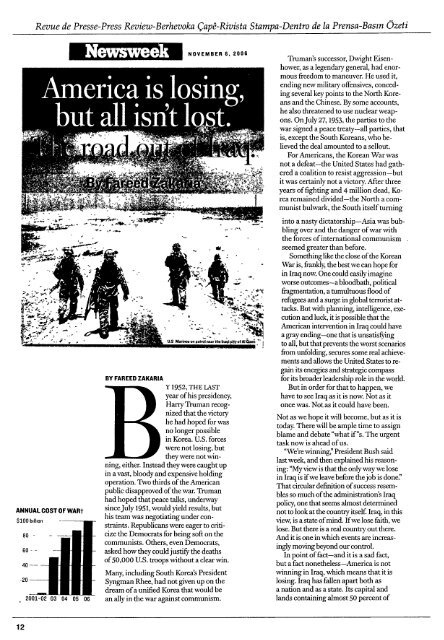Bulletin de liaison et d'information - Institut kurde de Paris
Bulletin de liaison et d'information - Institut kurde de Paris
Bulletin de liaison et d'information - Institut kurde de Paris
Create successful ePaper yourself
Turn your PDF publications into a flip-book with our unique Google optimized e-Paper software.
Revue <strong>de</strong> Presse-Press Review-Berhevoka C;ape-Rivista Stampa-Dentro <strong>de</strong> la Prensa-Basln Oz<strong>et</strong>i<br />
ANNUAL COST OF WARt<br />
$100 billion<br />
80 -<br />
60 - -<br />
04 05 06<br />
BY FAREED<br />
ZAKARIA<br />
NOVEMBER 6. 2006<br />
*-<br />
Y 1952, THE LAST<br />
year of his presi<strong>de</strong>ncy,<br />
Harry Truman recognized<br />
that the victory<br />
he had hoped for was<br />
no longer possible<br />
in Korea. U.S. forces<br />
were not losing, but<br />
they were not winning,<br />
either. Instead they were caught up<br />
in a vast, bloody and expensive holding<br />
operation. 'I\vo thirds of the American<br />
public disapproved of the war. Truman<br />
had hoped that peace talks, un<strong>de</strong>rway<br />
since July 1951,would yield results, but<br />
his team was negotiating un<strong>de</strong>r constraints.<br />
Republicans were eager to criticize<br />
the Democrats for being soft on the<br />
communists. Others, even Democrats,<br />
asked how they could justifY the <strong>de</strong>aths<br />
of 50,000 u.s. troops without a clear win.<br />
Many, including South Korea's Presi<strong>de</strong>nt<br />
Syngman Rhee, had not given up on the<br />
dream of a unified Korea that would be<br />
an ally in the war against communism.<br />
Truman's successor, Dwight Eisenhower,<br />
as a legendary general, had enormous<br />
freedom to maneuver. He used it,<br />
ending new military offensives, conceding<br />
several key points to the North Koreans<br />
and the Chinese. By some accounts,<br />
he also threatened to use nuclear weapons.<br />
On July 27, 1953, the parties to the<br />
war signed a peace treaty-all parties, that<br />
is, except the South Koreans, who believed<br />
the <strong>de</strong>al amounted to a sellout.<br />
For Americans, the Korean War was<br />
not a <strong>de</strong>feat-the United States had gathered<br />
a coalition to resist aggression-but<br />
it was certainly not a victory. After three<br />
years of fighting and 4 million <strong>de</strong>ad, Korea<br />
remained divi<strong>de</strong>d-the North a communist<br />
bulwark, the South itself turning<br />
into a nasty dictatorship-Asia was bubbling<br />
over and the danger of war with<br />
the forces of international communism<br />
seemed greater than before.<br />
Som<strong>et</strong>hing like the close of the Korean<br />
War is, frankly, the best we can hope for<br />
in Iraq now. One could easily imagine<br />
worse outcomes-a bloodbath, political<br />
fragmentation, a tumultuous flood of<br />
refugees and a surge in global terrorist attacks.<br />
But with planning, intelligence, execution<br />
and luck, it is possible that the<br />
American intervention in Iraq could have<br />
a gray ending -one that is unsatisfYing<br />
to all, but that prevents the worst scenarios<br />
from unfolding, secures some real achievements<br />
and allows the United States to regain<br />
its energies and strategic compass<br />
for its broa<strong>de</strong>r lea<strong>de</strong>rship role in the world.<br />
But in or<strong>de</strong>r for that to happen, we<br />
have to see Iraq as it is now. Not as it<br />
once was. Notas it could have been.<br />
Not as we hope it will become, but as it is<br />
today. There will be ample time to assign<br />
blame and <strong>de</strong>bate "what if"s. The urgent<br />
task now is ahead of us.<br />
"We're winning;' Presi<strong>de</strong>nt Bush said<br />
last week, and then explained his reasoning:<br />
"My view is that the only way we lose<br />
in Iraq is ifwe leave before the job is done."<br />
That circular <strong>de</strong>finition of success resembles<br />
so much of the administration's Iraq<br />
policy, one that seems almost <strong>de</strong>termined<br />
not to look at the country itsel£ Iraq, in this<br />
view, is a state of mind. If we lose faith, we<br />
lose. But there is a real country out there.<br />
And it is one in which events are increasingly<br />
moving beyond our control.<br />
In point of fact -and it is a sad fact,<br />
but a fact non<strong>et</strong>heless-America is not<br />
winning in Iraq, which means that it is<br />
losing. Iraq has fallen apart both as<br />
a nation and as a state. Its capital and<br />
lands containing almost 50 percent of<br />
12

















